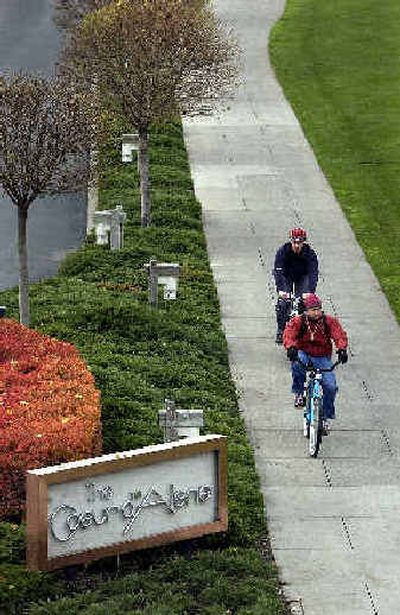Hagadone gives city plan to close street

Duane Hagadone formally asked Coeur d’Alene this week to close two blocks of Sherman Avenue for at least 25 years.
In the proposal submitted Tuesday, Hagadone requests a written agreement that would restrict traffic on the busy downtown street so he can convert it into a botanical garden criss-crossed with pedestrian and bicycle paths. He also asks to turn First Street, between Lakeside Avenue and Sherman Avenue, into public parking.
The proposal is part of Hagadone’s plan to expand The Coeur d’Alene Resort by building a new hotel tower, up to 12 stories and 175 rooms, on the corner of Sherman and Second Street where the Johnston Building sits.
The streets would remain city property, meaning Hagadone wouldn’t pay property taxes on the land. But Hagadone would have the responsibility and expense to develop and maintain the gardens, pathways and open spaces.
Deputy City Attorney Warren Wilson said Hagadone is requesting a maintenance and encroachment agreement instead of a street vacation. The latter would turn ownership of the streets over to Hagadone. The multimillionaire businessman has made it clear during numerous public presentations that he doesn’t want to own Sherman.
Wilson said Idaho courts have ruled that these types of agreements can’t be permanent and that’s why the arrangement would be valid for 25 years. After that time, the City Council could agree to extend the contract.
“A drawback is he doesn’t pay taxes but the exchange is the city keeps a little more control,” Wilson said.
If Hagadone had asked for a street vacation he could theoretically do anything with his private property such as building a restaurant or another hotel tower in the middle of Sherman Avenue.
Wilson said the agreement is similar to what Hagadone currently has for the small section of First Street, south of Sherman Avenue, that runs to the front door of the Hagadone Corp. headquarters. That strip of First Street is still city property, but Hagadone’s agreement has covered the pavement with grass and landscaping. This agreement has no specific expiration date. Wilson said it probably was drawn up before the new legal restrictions on permanent agreements.
Hagadone’s request said that Sherman Avenue wouldn’t be closed until construction starts on the new hotel tower, which could be in the next two years.
He also wants the Lake City Development Corp., the city’s urban renewal agency, to pay for rerouting traffic from Northwest Boulevard onto Lakeside.
Because Sherman Avenue would be closed, drivers heading south on Northwest Boulevard would turn east on Lakeside Avenue. From there, drivers would be routed back onto Sherman Avenue via Second Street, wrapping in front of the new hotel tower. Through-traffic would be encouraged to stay on Lakeside Avenue until it dumps onto Sherman at Eighth Street.
The city Public Works Committee is scheduled to hear the proposal Dec. 13. The committee will make a recommendation to the City Council, which has final say. Wilson said the city will have public hearings, giving residents and downtown business owners a chance to comment.
Hagadone’s idea to change the way drivers have accessed downtown for decades has caused mixed reaction, especially from some Sherman Avenue business owners who fear that rerouting traffic would hurt their sales.
The Coeur d’Alene Downtown Association is hiring a consultant to evaluate Hagadone’s proposal and determine the effect on downtown merchants. The consultant, whom the association declined to name, should have a report by Friday.
Association Manager Carrie Cook said the out-of-town consultant, who is familiar with Coeur d’Alene, will spend one day in Coeur d’Alene talking with Hagadone and downtown merchants. The consultant then will review the information and make a recommendation to the association’s board. The 13-member board will then vote, and that outcome will become the position the association will represent to the Public Works Committee and the City Council.
Hagadone has hired JUB Engineering to do a traffic study on rerouting downtown drivers.
JUB owner Jim Coleman already has said he thinks it’s feasible to close the two blocks of Sherman and reroute traffic onto Lakeside Avenue.
But engineering is not the concern. Hagadone has said that he won’t go forward with the plan unless the public agrees to the idea. His backup plan is to possibly build a hotel tower in Spokane, across from the Spokane Convention Center.
Hagadone, for the second time in two weeks, met Thursday with more than 200 locals and business owners to go over the specifics of his plan.
Cook said she was impressed with the turnout.
Hagadone met with the city’s Pedestrian and Bicycle Advisory Committee Wednesday.
His idea is to route the Centennial Trail through the botanical garden, which would be a memorial to his parents. Hagadone told the committee that his intention is to close the garden at night, perhaps from 11 p.m. to 6 a.m., to prevent vandalism. Hagadone said the boardwalk in front of the resort is closed every night for the same reason.
Committee member Chris Copstead, a former City Council member, said that Hagadone told the group it “breaks his heart” to see his red geraniums uprooted and thrown into the lake by vandals. Copstead said Hagadone wouldn’t mind as much if people took the plants home to put in their own gardens.
Some committee members are concerned about closing the popular trail at night and in the early mornings, but Copstead said a lot more discussion is needed.
He said the Centennial Trail is already prone to vandalism, with broken lights and a stolen sculpture, so he can see why Hagadone is concerned about his garden.
Copstead said the North Idaho Centennial Trail Foundation will discuss Hagadone’s plan at its Nov. 18 meeting.
“Hagadone, quite honestly from the foundation’s view, has been a great partner of the trail system,” Copstead said.